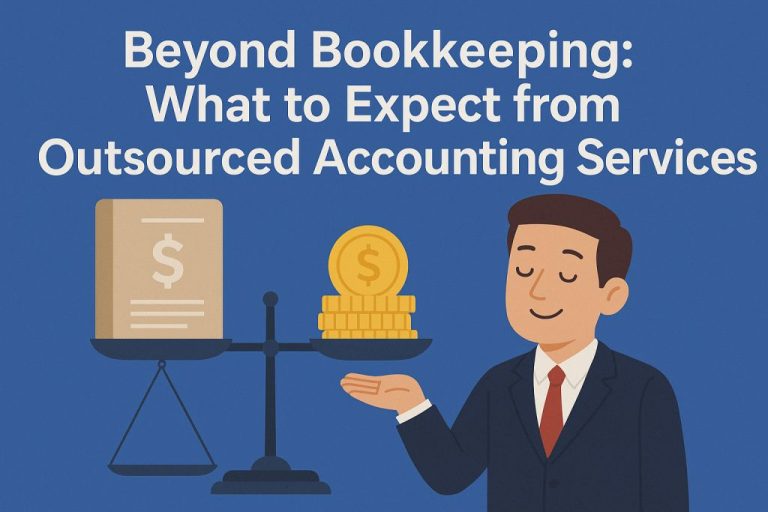Outsourced Bookkeeping vs In-House Bookkeeping: Which is Right for Your Business?
The Backbone of Financial Health
Let’s face it—bookkeeping isn’t the most glamorous part of running a business, but it is one of the most crucial. Your financial records are like the foundation of your house—get it wrong, and everything else crumbles. But here’s the kicker: how you handle your bookkeeping can make or break your financial clarity.
Why Bookkeeping Choices Matter
Choosing between outsourced and in-house bookkeeping isn’t just about preference—it’s about strategy. Think of it like deciding between cooking at home or hiring a chef. Each option has its perks, costs, and pitfalls. So, what’s right for you?
Understanding the Basics
What Is In-House Bookkeeping?
Definition and Core Responsibilities
In-house bookkeeping means your financial records are handled internally—either by you or someone on your payroll. It involves tasks like managing invoices, reconciling bank statements, and tracking expenses.
Typical Setup and Team
Usually, it’s a small team (sometimes just one person) working with accounting software, juggling spreadsheets, and maybe asking, “Where did that $500 go?”
What Is Outsourced Bookkeeping?
How It Works
With outsourced bookkeeping, you hire a third-party firm or freelance accountant to handle your books remotely. You send them the data—they do the magic.
Common Services Provided
Think expense tracking, payroll, tax prep, bank reconciliation, and even cash flow analysis. Some firms offer CFO-level insights without you needing to break the bank.
Cost Considerations
In-House Bookkeeping Costs
Salaries and Benefits
Hiring someone full-time means paying a consistent salary, health benefits, vacation days—you get the idea. According to Glassdoor, an average bookkeeper’s salary in the U.S. is $45,000–$55,000 annually.
Training and Infrastructure
There’s also onboarding, continuous training, and tools like QuickBooks or Xero, plus laptops, software licenses, and desk space. It adds up quickly.
Outsourced Bookkeeping Costs
Pay-As-You-Go Pricing
Most outsourced services offer flexible monthly packages. You pay only for what you need, starting as low as $200/month.
Hidden or Surprise Fees
Watch out for overages, hourly fees, or expensive add-ons. Transparency is key—always read the fine print.
Scalability and Flexibility
Can Your Bookkeeping Grow With You?
An in-house bookkeeper might struggle when your business grows rapidly. Outsourced teams, though, often scale seamlessly—more volume? No problem.
Adapting to Seasonal or Sudden Demand
Busy season? Product launch? An outsourced team can ramp up quickly, while your internal team might be stuck putting out fires.
Accuracy and Expertise
Skill Level of In-House Staff
Unless you hire a CPA or an experienced finance pro, mistakes happen. Human error is a real risk when you’re multitasking with limited resources.
Specialized Knowledge in Outsourced Teams
Outsourced firms usually employ experts who stay updated with tax codes, industry trends, and best practices. That’s peace of mind money can buy.
Control and Accessibility
Day-to-Day Oversight with In-House
Having someone in-house means face-to-face interaction, quick feedback, and constant updates. You control how and when things are done.
Real-Time Access with Outsourced Systems
Many outsourced services use cloud-based tools, offering 24/7 access and real-time dashboards. No need to knock on someone’s door to ask about cash flow.
Security and Compliance
Data Security Concerns
Worried about sending your data off-site? That’s fair. But reputable outsourced firms use encrypted systems, NDAs, and secure portals to protect your data.
Legal Compliance and Regulatory Knowledge
Outsourced professionals often have more experience navigating changing tax laws and regulatory requirements, reducing your audit risks.
Technology and Tools
In-House Software Setup
Managing your own tools means paying for licenses, handling updates, and troubleshooting bugs yourself—or hiring IT help.
Outsourced Tech Platforms and Automation
Many outsourced providers bring their own stack of software—automated, integrated, and efficient. You get enterprise-level tech without the enterprise cost.
Time Commitment and Management
Time Demands on Internal Teams
Every hour your team spends on bookkeeping is an hour not spent growing your business. Simple as that.
Time Saved Through Outsourcing
Outsourcing frees up your time—and mental space—so you can focus on what you do best.
Pros and Cons Comparison
In-House Bookkeeping: The Good and the Bad
Pros:
- Full control
- Direct oversight
- Easier communication
Cons:
- High cost
- Limited scalability
- Risk of errors if underqualified
Outsourced Bookkeeping: The Good and the Bad
Pros:
- Cost-effective
- Scalable and flexible
- Access to expert knowledge
Cons:
- Less control
- Possible communication delays
- Security concerns (if not vetted properly)
Which Is Best for Your Business Size?
Small Businesses
Outsourcing usually wins here. It’s affordable, efficient, and doesn’t require a full-time hire.
Medium to Large Enterprises
Larger businesses may benefit from hybrid setups—internal control plus outsourced support for overflow or complex needs.
Real-Life Scenarios and Use Cases
Startups with Tight Budgets
Startups can’t afford to burn cash. Outsourcing helps you stay lean and focused.
Scaling Companies Needing Flexibility
Growing fast? Don’t bottleneck your finances. Outsourced firms scale as you scale.
Hybrid Models: The Best of Both Worlds?
Some companies blend both: keep a finance lead in-house while outsourcing the grunt work. It’s like having your cake and eating it too.
Red Flags to Watch Out For
Common Mistakes Businesses Make
- Hiring unqualified in-house staff
- Picking the cheapest outsourced provider
- Not setting clear expectations
How to Spot a Bad Provider or Setup
Look out for poor communication, lack of transparency, outdated software, or vague contracts.
Decision Time: A Step-by-Step Guide
- Assess your budget
- Consider your growth plans
- Evaluate internal resources
- Interview providers or candidates
- Test with a small project if outsourcing
Conclusion
So, what’s the verdict? There’s no one-size-fits-all answer here. In-house bookkeeping gives you control and face time, while outsourcing offers flexibility and expertise without the overhead. The best choice? It’s the one that fits your business goals, budget, and growth plans like a glove. Crunch the numbers, weigh the pros and cons, and trust your gut—your books (and your future self) will thank you.
FAQs
Is outsourced bookkeeping safe for my business?
Yes—if you choose a reputable provider with strong data security protocols and good reviews.
Can I switch from in-house to outsourced easily?
Absolutely! Many providers specialize in onboarding new clients and transferring your data securely.
How do I know if I’m overpaying for bookkeeping?
Compare market rates, evaluate hours spent, and check for redundant or unnecessary services.
What industries benefit most from outsourcing?
Startups, e-commerce, agencies, and seasonal businesses gain the most from flexibility and cost savings.
Should I outsource internationally or locally?
Depends on your priorities—international may be cheaper, but local firms offer better communication and regulatory familiarity.







